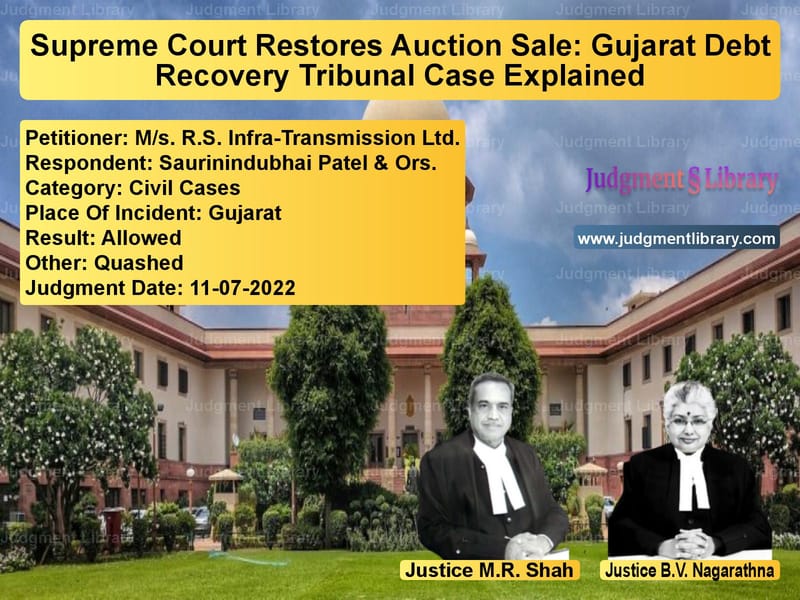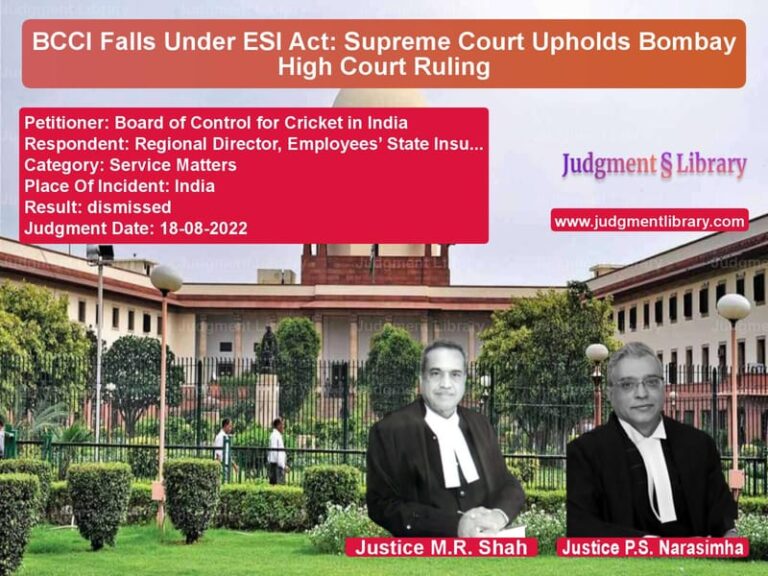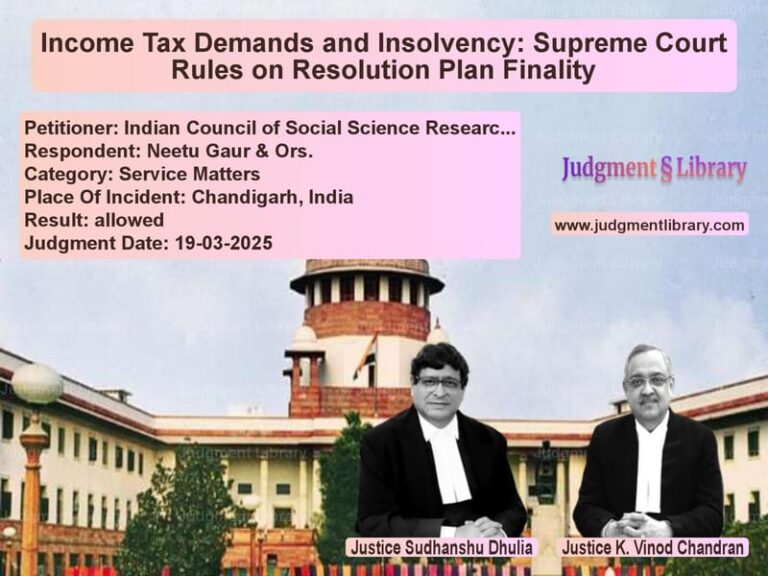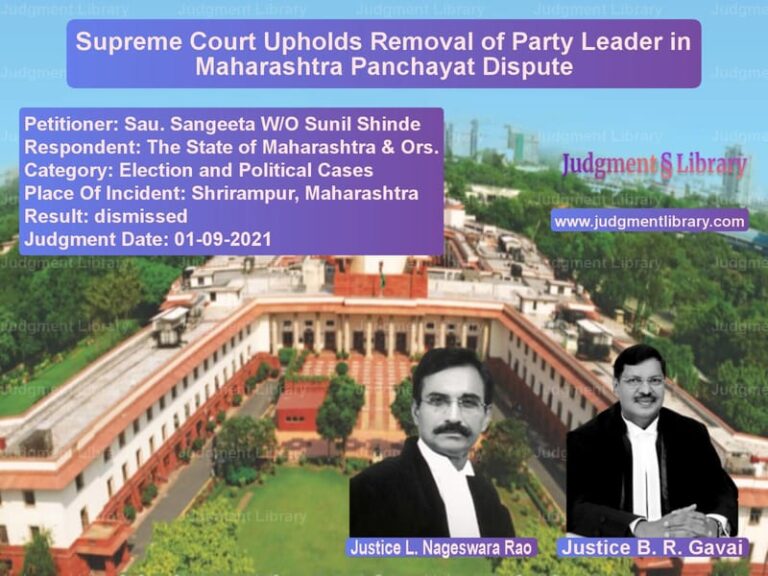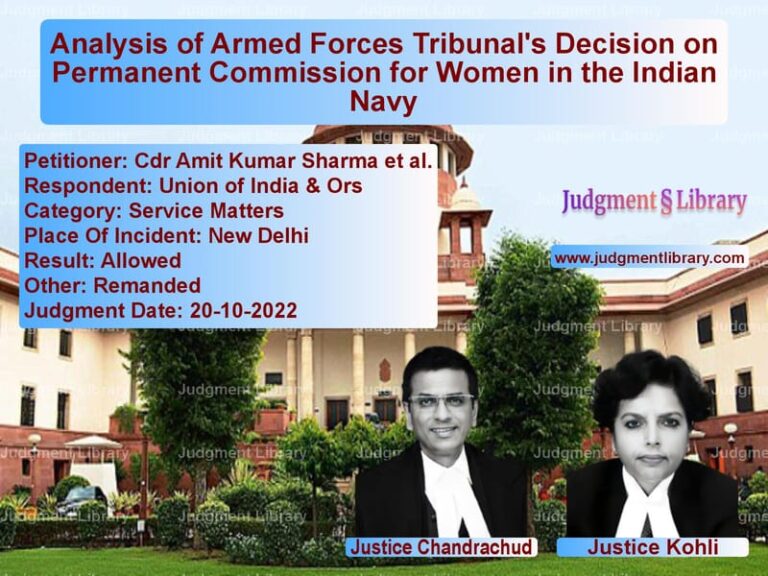Supreme Court Restores Auction Sale: Gujarat Debt Recovery Tribunal Case Explained
The case of M/s. R.S. Infra-Transmission Ltd. vs. Saurinindubhai Patel & Ors. is a landmark judgment concerning debt recovery, auction sales, and the rights of borrowers under Rule 60 of the Second Schedule of the Income Tax Act, 1961. The Supreme Court overturned a Gujarat High Court decision and reinstated the auction sale in favor of the auction purchasers.
This case highlights the complexities of debt recovery, auction proceedings, and the rights of borrowers to reclaim their properties. It serves as a significant precedent regarding how courts should interpret Rule 60 and what constitutes substantial compliance when borrowers seek to redeem their properties.
Background of the Case
IndusInd Bank Ltd. initiated debt recovery proceedings against the original borrowers for an outstanding amount of Rs. 71,88,819.87, which was later subject to a Recovery Certificate for Rs. 1,27,30,527, including interest as of June 30, 2006. The properties of the borrowers were attached and scheduled for a public auction.
On January 8, 2007, the auction was conducted, and the highest bid of Rs. 1.35 crore, made by respondents 1 and 2, was accepted. However, the original borrowers sought to set aside the auction under Rule 60 of the Income Tax Act by depositing the amount mentioned in the sale proclamation.
The Recovery Officer, acknowledging the deposit, set aside the auction sale, leading to legal disputes that traveled through the Debt Recovery Tribunal (DRT), the Debt Recovery Appellate Tribunal (DRAT), the Gujarat High Court, and ultimately, the Supreme Court.
Key Legal Issues
- Did the borrowers fully comply with Rule 60 to redeem their properties?
- Was the Recovery Officer justified in setting aside the auction sale?
- Should minor shortfalls in deposit amounts lead to cancellation of auction sales?
- What rights do auction purchasers have when the borrower attempts to reclaim the property post-auction?
Arguments Presented
Petitioner’s (M/s. R.S. Infra-Transmission Ltd.) Arguments:
- The auction purchasers argued that the original borrowers failed to deposit the full amount due, leading to non-compliance with Rule 60.
- The shortfall of Rs. 77,647 in the deposit should have rendered the borrower’s application under Rule 60 invalid.
- The borrowers acted dishonestly by delaying their full payment and should not have been allowed to reclaim their property.
- The High Court erred in setting aside the DRAT’s order, which had correctly upheld the auction sale.
Respondent’s (Original Borrowers) Arguments:
- The borrowers contended that they acted in good faith and deposited the principal amount mentioned in the sale proclamation.
- The shortfall was due to an error in the proclamation, and once they received the correct amount from the bank, they promptly paid the difference.
- Their right to redeem the property under Rule 60 should be interpreted liberally.
- The sale should have been set aside as they met the substantial requirements of Rule 60.
Supreme Court’s Observations and Ruling
The Supreme Court ruled in favor of the auction purchasers and overturned the High Court’s decision. Key observations include:
- The sale proclamation should have clearly stated the full amount, including interest, to be paid for redemption.
- The shortfall of Rs. 77,647, though seemingly small, indicated non-compliance with Rule 60.
- The auction purchasers had a vested right in the property, which could not be taken away due to a belated deposit by the borrowers.
- The Recovery Officer erred in allowing the borrowers to reclaim the property after auction completion.
The Supreme Court emphasized:
“When the substantial amount was deposited, there was no reason for the judgment debtor not to deposit the shortfall, which as such can be said to be a very meager amount. However, the rule requires strict compliance, and the shortfall resulted in non-compliance.”
The Court restored the DRAT’s order, upholding the auction sale and directing that the borrowers’ deposited amount be refunded.
Key Takeaways from the Judgment
- This ruling establishes that strict compliance with Rule 60 is necessary for borrowers seeking to reclaim properties after auction.
- The decision reaffirms the rights of auction purchasers, preventing post-auction reversals unless Rule 60 is fully complied with.
- The judgment highlights the need for clear and accurate sale proclamations to avoid disputes.
- The ruling discourages borrowers from using technicalities to regain properties after auction proceedings are finalized.
Impact of the Judgment
- The case sets a precedent for interpreting Rule 60 in future debt recovery and auction proceedings.
- It ensures that auction purchasers are protected from arbitrary cancellations of sales.
- The ruling emphasizes the importance of accuracy in sale proclamations.
- Financial institutions will now have clearer guidelines for conducting and enforcing auction sales.
Conclusion
The Supreme Court’s verdict in this case clarifies the legal framework surrounding debt recovery, auction sales, and borrower rights. The ruling reaffirms that strict compliance with Rule 60 is essential and that auction purchasers should not be deprived of their rights due to procedural lapses by borrowers. This decision will serve as a guiding precedent for similar cases in the future.
Petitioner Name: M/s. R.S. Infra-Transmission Ltd..Respondent Name: Saurinindubhai Patel & Ors..Judgment By: Justice M.R. Shah, Justice B.V. Nagarathna.Place Of Incident: Gujarat.Judgment Date: 11-07-2022.
Don’t miss out on the full details! Download the complete judgment in PDF format below and gain valuable insights instantly!
Download Judgment: ms.-r.s.-infra-tran-vs-saurinindubhai-patel-supreme-court-of-india-judgment-dated-11-07-2022.pdf
Directly Download Judgment: Directly download this Judgment
See all petitions in Debt Recovery
See all petitions in Contract Disputes
See all petitions in Damages and Compensation
See all petitions in Judgment by Mukeshkumar Rasikbhai Shah
See all petitions in Judgment by B.V. Nagarathna
See all petitions in allowed
See all petitions in Quashed
See all petitions in supreme court of India judgments July 2022
See all petitions in 2022 judgments
See all posts in Civil Cases Category
See all allowed petitions in Civil Cases Category
See all Dismissed petitions in Civil Cases Category
See all partially allowed petitions in Civil Cases Category

